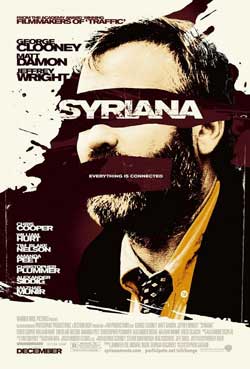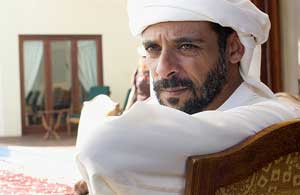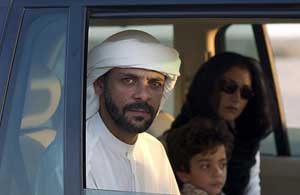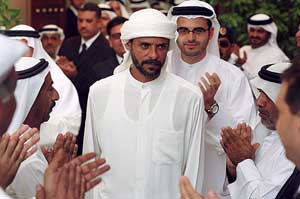 In person Alexander Siddig is filled with energy. In Syriana he plays a much more restrained character, the prince of an unnamed Middle Eastern country who is trying to wean his economy off of oil dependence – and American dependence. This, of course, pisses the Americans off a little bit.
In person Alexander Siddig is filled with energy. In Syriana he plays a much more restrained character, the prince of an unnamed Middle Eastern country who is trying to wean his economy off of oil dependence – and American dependence. This, of course, pisses the Americans off a little bit.
I have seen Siddig in a couple of thing recently – most notably a very great episode of the British espionage show MI-5– but I hadn’t been able to shake the image of the slightly femme Dr. Bashir from Star Trek: Deep Space Nine. Until this role, which Siddig fills with equal parts rage and nobility. It was a treat to talk to Siddig, not only because he was great in the film, but also because he brought the Arab perspective to this press day, something needed for a film revolving around the Middle East.
Q: So you’re playing two characters named Prince Nasir in two movies in a row…
Siddig: Isn’t that weird? Isn’t that a strange thing? And the Kingdom of Heaven one was changed, and I’d already started filming Syriana as if they decided that I should be called whatever I was called in Syriana. It’s very odd. He was called [something I can’t spell] before, who was a real character, a historian for Saladin who wrote his diary for him every night, kind of his ghost writer. For some reason, they thought that was politically uncool, so they changed my name to “Nasir” and I’m “Nasir” in this as well. How d’ya like them apples?
Q: What drew you to this movie?
Siddig: It would be impossible not to be drawn to this movie as an actor, especially as an Arabic actor or someone who works on a sort of ethnic fringe in a small vein of one of the many seams of acting. To pass up or not be interested in someone who seems normal and real would be crazy. I end up speaking so grandly, when I don’t know if I have the right to, but to pass up the diplomatic potential of a character like this would be really foolish. Because I think whether you’re in the Middle East or in Europe or America, you can identify with this person.
Q: Can you expand on this since he has the potential to be a heroic character? Siddig: He’s the personification of the great missed opportunity. He’s the chance that America had to turn things around, if only they hadn’t been so angry that he’d given the contract to someone else. Matt Damon’s character came along and warned him, ‘Hey, you have to be able to finance what you’re planning to do. If you want emancipation, suffrage, you want civil liberties and freedom of the press that crazy liberals like, then you’re going to have finance it somehow. And the only way you can do that is not just to sell your oil, but to ship it, and be in all different aspects of it. Understand your business. Don’t just give plots of land away willy nilly to people. Own the plots yourself, market it. Be American. Market Understand your market. Diversify. Synergize.You can do all these things, and the Chinese know about this stuff, too.’ That was just dropped in there, and it’s one of the most significant points in the film, because China is the Middle East.
Siddig: He’s the personification of the great missed opportunity. He’s the chance that America had to turn things around, if only they hadn’t been so angry that he’d given the contract to someone else. Matt Damon’s character came along and warned him, ‘Hey, you have to be able to finance what you’re planning to do. If you want emancipation, suffrage, you want civil liberties and freedom of the press that crazy liberals like, then you’re going to have finance it somehow. And the only way you can do that is not just to sell your oil, but to ship it, and be in all different aspects of it. Understand your business. Don’t just give plots of land away willy nilly to people. Own the plots yourself, market it. Be American. Market Understand your market. Diversify. Synergize.You can do all these things, and the Chinese know about this stuff, too.’ That was just dropped in there, and it’s one of the most significant points in the film, because China is the Middle East.
Q: It’s straight out of next year’s headlines, not last year’s.
Siddig: That’s right. Next year’s headlines is going to be “China is the Middle East.” The reason why nothing is happening in Darfur is because China runs Sudan and who’s going to mess with China on the Security Council? And the Americans are going up against what happens to be some interesting minerals in Darfur and it all gets very funkadelic. To amplify on that character, he’s what we hopes exists.
Q: How do you feel about the CIA and their dealings in the Mideast?
Siddig: That’s one of the points this movie is making. Dick Cheney talks about the “dark side” as referring to the secret services, the CIA, or whatever they’re called. I think that there’s something wrong. These government agencies are off the leash in some way and they’re supra-government now and they really shouldn’t be. They’re working for the wrong people. They’re supposed to be working for the Americans, and according to our movie, there is an insinuation that they’re working for corporate America. We’re in incredibly dangerous water.
Q: Do you see yourself as a heroic figure?
Siddig: I’m a heroic figure. I don’t know about my character. [laughs] No, no, it was just too good an opportunity.
He is a heroic figure. If I was in that position, I would love to be that guy, and I’m not even sure I wouldn’t mind being shot by the goddamn Americans, if that was the case, or the Russians, or the Filipinos, or whoever happens to rule the world at that particular moment in time, in my fantasy scenario. Because to live like that, it’s Gandhi, it’s another form of that but just the Arab version.
Q: Your character in power could be more like a Chavez, from Venezuala.
Siddig: Chavez has a population that appreciates edgy, macho guys. I think the Arab world has no personality cult situation going on that they have in much of the Western world, South America included. They are a culture of words and religion, and you won’t see many charismatic people on Al Jazeera, except for the ones who are now learned presenters. You see Arab leaders getting on TV – which was very hard for me working out how to do the part, since Arab leaders are looking somnambulant, staring into their microphone, almost as if someone’s got a hand up their back.
charismatic people on Al Jazeera, except for the ones who are now learned presenters. You see Arab leaders getting on TV – which was very hard for me working out how to do the part, since Arab leaders are looking somnambulant, staring into their microphone, almost as if someone’s got a hand up their back.
Q: You’re talking about state leaders.
Siddig: Yes, state leaders. If we’re talking about madrassas or clerics, their job is to be hysterical.
Bin Laden actually is the most European or westernized of all the leaders. He’s the one who is the most polished ironically. He’s smart and handsome and rich… you know, he’s quite the eligible guy. Well trained by the CIA. He’s a very dangerous man indeed and he now has this franchise called Al Qaeda, which rivals Starbucks in its ubiquity.
That’s not a really cool thing to say, is it?
Q: Now that the West is so embroiled in the Middle East, our TV shows and films are starting to have more Arabic characters. Except that they’re always the good Palestinian or the bad Palestinian. It’s either the saintly Arab or the suicide bomber. Is that just as bad as not having these characters at all?
Siddig: No, that’s great, and it’s idealistic to think it’s ever going to get any better. Even now, we have the good American and the bad American in movies, and the good Englishman and the bad Englishman. We’re dealing with archetypes, and we’re not going to get these subtle nuanced people unless Ruth whatever-her-name is, who writes all the Merchant Ivory things, does everything, because she’s such a beautiful writer. While you’ve got movies that have to deal with archetypal subjects and stereotypes than good and bad is what we’re going to get, and I’m happy with it.
Q: Syriana is kind of unusual for its portrayal of the oil field workers who become suicide bombers.
Siddig: Wasim is my favorite character in the movie and it’s very dangerous to big him up, because they’re almost idealizing suicide terrorists, but it’s a fascinating storyline. Steve Gaghan I put right along Ruth. They can write these nuanced characters. That’s just great writers; great writers can always do that. The basic lowest common denominator, I’m happy with just good and bad, as long as they’re both there. As long as it’s not just some guy with a Kalashnikov shouting “Allahu Akbar” on a Boeing 747, then it’s terrific to see more. It means we’re getting to know each other and I like that.
Q: It must be pretty great to be an Arab actor who gets such great roles – two this year.
Siddig: I’m one of the luckiest Arab actors on the planet, because I’ve done, I think, two of the finest Arab roles that have been out in mainstream cinema for a very long time. Apart personal trip for me has been wonderful. I have an English side called Alexader and a Sudanese side called Siddig, and they’re beginning to meet each other in me, let alone the greater picture, and I’m hoping that people from both sides will meet each other. So there’s a personal journey which I would love it if it was reflected in the bigger, wider world, because we’re all quite good friends. We just don’t know it yet.
Q: I was telling a friend that you’re in this film and that you’re great, and he said, ‘Finally, someone escaped the Star Trek curse!’ Were you aware of that curse, that actors seem to go into Star Trek and never quite emerge? Siddig: Yeah, yeah, I’m aware of that. I’m just in a very bizarre niche and there aren’t many people you can go to. But I blame Ridley Scott really, because he was the person who went ‘I love Star Trek and I’d love it if you were in my movie.’ People like Oliver Stone went “I hated Star Trek, and I don’t want you in Alexander!” I was really lucky there.
Siddig: Yeah, yeah, I’m aware of that. I’m just in a very bizarre niche and there aren’t many people you can go to. But I blame Ridley Scott really, because he was the person who went ‘I love Star Trek and I’d love it if you were in my movie.’ People like Oliver Stone went “I hated Star Trek, and I don’t want you in Alexander!” I was really lucky there.
But it is Ridley Scott’s fault because he was the one who put me in a grown-up movie. I mean I’ve been in other movies, but there are different kinds of parts in movies, I found out. There are parts that you can do them all your life, and no one knows you’re even acting, and there are other parts which somehow – I think they say they ‘pop’ – people notice that you’re in and you become an actor from the movies and people take you in a whole different way. Whether or not I can keep that ball rolling is another matter. But Star Trek, I wouldn’t be here if it wasn’t for it, so it’s pretty great. And it means that I’m a relatively friendly face to a lot of Americans and it’s useful for that rather pretentious diplomatic trip I’m on.
Q: So did you discuss a lot of medical issues with George Clooney?
Siddig: That’s right, we both played doctors on TV!
Q: How was it working with George – and with the whole cast?
Siddig: I have nothing but respect for Clooney. For the cast, we didn’t all meet. It wasn’t a very huggy atmosphere; it was a very crisp, professional situation. Everbody was on the dime, so they would ship us in for two minutes if we had two minutes worth of work and then ship us out again. Having us lie around in a hotel room was a waste of money. So literally you came into work and left, came into work and left, over the space of eight weeks. It was the least amount of time I have spent on a film, and the most words and dialogue and impact that I’ve had on the film.
There was a massive effort to save money, unlike most films, where it doesn’t seem to matter. So I didn’t meet most of the cast. Jeffrey Wright I just met in the corridor here, and he’s like the main actor in the movie. I haven’t met anybody except Matt and George.
Q: And it was good working with George?
Siddig: He’s going to be president one day. I mean it. He’s an adorable guy. It’s like meeting the real thing. If you could meet James Stewart when he was James Stewart.
Q: What have you got coming next?
Siddig: The thing I’m most interested in is about Hannibal. It’s an epic, but a low budget one. It’s not the Vin Diesel one. We’ve got one elephant.
Q: Would you go back and do more Star Trek?
Siddig: Yeah, I would go back. I would do any work, as long as I liked it.